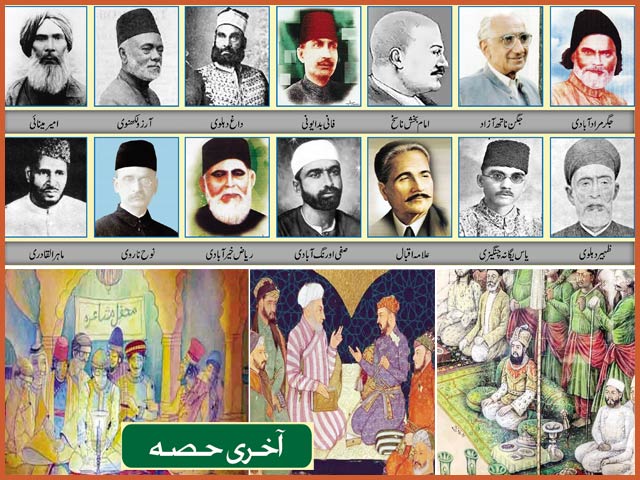Jagannath Azad says that I read Allama Iqbal’s “Baal Gabriel” from Allama Tajur Najeebabadi. Different aspects of poetic understanding were also discussed during teaching.
Sometimes I would also present my spoken word for correction, which he would listen to with great compassion and love and also inform about the necessary changes. I once recited one of my poems to him:
If one sees these difficulties of the people of love
He has told the heart rivals that he is worried
On this Allama Sahib said that instead of “people of love” do “the path of love”. Now just see that the color of the poem has changed with a slight word change:
If one sees these problems of “Rah Hi Mohabbate”.
He has told the heart rivals that he is worried
In the same way, once Jagannath Azad narrated the poem to Allama Iqbal for reformation:
Now I don’t have the courage to get up and eat arrows
They are saying that there is no love left in you
On this he said, instead of “Awa Utah” say “Utah Utah” then the enjoyment of the poem will be doubled in terms of language:
He did not have the courage to eat the arrows of “get up”.
They are saying that there is no love left in you
Mahar-ul-Qadri wrote his memories about Nawab Nisar Yar Jang Bahadur in the second volume of his book “Yad Raftgaan”, Nawab Sahib was not only a poet, but also a poet himself and had a good mood. Once at Nawab Sahib’s house, I recited one of my ghazals to Nawab Sahib. When I read this verse of Ghazal:
May God bless you with spring
There is association everywhere
After listening to the poem, he first praised Dadutahsin and then said, Mahir Mian!! If you don’t mind, replace the word “place” with the word “side” in the second stanza because the word “place” feels a burden on the sharpness of hearing due to its weight. And now the poem became like this:
May God bless you with spring
There is association everywhere
Syed Altaf Hussain Soraya, was a poet of delicate thought and skill. He was very proud of his poem:
The snares are falling from a distance, the bow of beauty
Automatically something is drawn to your sleeping friend
Whoever heard it would applaud. But later, when Munir became a disciple of Shikoh Abadi and proudly presented this poem to Ustad Grami, the Ustad changed only one word in the poem and changed the color of the poem:
The snares are falling from a distance, of the bow of beauty
Automatically “Ya” is drawn to your sleeping friend
By replacing the word “something” with “or” a new meaning was created in the poem which was missing before.
Amir Minai’s student Brahm submitted one of his poems to the teacher for revision:
The beauty of someone made him eager
Which is electrifying today
Amir Minai left the rest of the poem as it was, only adding a little touch to the first stanza and adding to the meaning of the poem:
Hasan’s Purtu of “Yeh Kis” made him eager?
Which is electrifying today
The well-known elegiac poet Waheed Al Hasan Hashmi took the discipleship of Arzu Lucknowi in the beginning of his poetry. Although this discipleship was limited to the reformation of only one poem, but Waheed Saheb remained devoted to the discipleship of this one poem of Arzoo Sahib throughout his life. Waheed-ul-Hasan Hashmi wrote the following poem and sent it to the service of Arzoo Lucknowi for correction:
Mubarak Mubarak Shaheed Love
That in this way death is also life
In the second stanza of the poem, only one word “Bhi” was replaced by “Hi” by Ustad Arzoo, thanks to which the universality and semantic precision of the poem increased:
Happy martyr love
That in this way death is “the” life
A gathering was held in the haveli of Nawab Bahadur Yarjung in Hyderabad. Under the chairmanship of Fani Badayouni, all the famous names of the world of poetry participated in the event. Maherul Qadri was presenting his speech. He recited the poem:
The heart of Parwana has become cold
Why is the candle burning from this evening?
The poem was to be read, and Fani Badayouni, who was nearby on the back, repeating the poem by himself, repeated the second stanza in an improvisational style as follows:
It became cold, maybe the heart of Parwana
Why is the candle “blinking” since this evening?
And thus, with a single word change, the correct image of the candle was captured.
The poet of Moradabad and student of Moradabadi Jigar in poetry Zul Noreen recited the following poem to Jigar Sahib with great respect in a private gathering of poets held at his house:
The message of his sight or love of the heart came
Greetings to the heart of spring without autumn
Jagar Sahib heard the poem, paused for a while, and said Noreen Mian! If you do the first stanza like this, the literal and intellectual meaning of the poem will become clear:
A message of grief came from his sight
Greetings to the heart of spring without autumn
And thus, instead of “Ishrat-i-Dil”, “Ishrat-i-Gham” has reduced the beauty of the poem.
Mushfiq Khawaja, in his book “Tahqiq Nama” in an article he wrote regarding the poetry of Mir Ali Zaman Shoq, mentions that Mir Ali Zaman Shoq recited his poem in front of his father, Mir Azwa Ali Rishq:
This new scar has been given to me by fortune
If the light comes on the gore, it will dissolve the air
Rishak listened to the poem and made a slight change in the first stanza to make the word arrangement of the poem more beautiful.
Bakht Tera has “given” this Niadag to me
If the light comes to the grave, make the air bloom
This poem of Hazrat Allama Iqbal was recited in front of Maharul Qadri, a proud student of late Nawab Dagh and the teacher of his time:
If it is effective or not, listen to it and die
This free man is not a seeker of Dad
After listening to the poetry spoken by Maherul Qadri, Hazrat Iqbal’s demand seems a little unreasonable. Now who gives praise to the cry? The poem would be more meaningful if it were like this with a difference of one word:
If it affects you or not, listen to it and die, “Rodad”.
This free man is not a student of Dad!!
An annual mushaira was held here in Taluka Dar Sandela District Harnai. Renowned teachers from all over India were present. Mirza Yas Yagana Chingizi read the notice:
It hugs a lot of nostalgia when it comes from the heart
I stay and say a greeting from the destination
There was a crowd of admirers, a shout of praise was raised. One point of understanding Sahib-i-Fahm Arzoo was sitting by the side of Lucknowi, when the noise of Dado-Tahsain stopped, he sighed and said, Hazrat! The destination is the place to stay, then what is the need to say ‘stay’? When Arzoo heard the criticism, he addressed Yegana and said, What a good thing he has said! How has the spirit of patriotism shown! Subhan Allah. Say it again! And then he himself began to read the poem like this:
“Flip” I say a greeting from the destination. great… Yagana immediately came to the point and repeated the message thus:
It hugs a lot of nostalgia when it comes from the heart
“Turn around” and say a greeting from the destination
Aziz Yar was a disciple of Jang Dagh and used to get corrections on his speech frequently through correspondence. He sent the following poem to the teacher for correction:
Do you know the pleasure of Tegh water Mr. Khizr?
They are barren on their own livelihood
The correction given by Ustad Dagh added to the beauty of the poem:
Do you know the pleasure of Ab-i-Tigh, Mr. Khizr?
They “die” at the fountain of life
Mustafa Khan Nazer, a disciple of Noah Norway, sent his following poem for correction:
From the fall, the moon became perfect
Always someone’s Shabab is difficult
A change of just one word by Noah Norwegian in the poem made the poem four moons:
From the fall, the moon became perfect “Roshan”.
Always someone’s Shabab is difficult
Meksh Akbarabadi writes in his book “Agra and Agra Wale” that Ustad Dagh recited a poem during a mushaira in Agra:
It is a great fun that I will do in Mahshar
For God’s sake, keep silent about those vows
On this, Mirza Raees, who was present in the mushaira, pointed at him and said, Huzoor! Where will there be an opportunity to complain in Mahshar? Say it like this:
It is great fun that I do “Frayad” in Mahshar.
For God’s sake, keep silent about those vows
There is a poem by Khawaja Haider Ali Atesh:
A deal has been made for the hunting of the jinns
I am making a noose from the string of the necklace
On this, Saadat Khan Nasir writes in his book Tazkira Zaiba that ‘In the world of terror, a person is not even aware of anything, let alone making a snare for a rooster. This poem would have been better if it had been said like this:
؎ There is a deal to which the rooster is the prey of the jinns
Make a noose of my neck string
Raja Sahib Mahmoodabad once said to Riaz Khairabadi, if your teacher Amir Minai was alive today, he would be proud of you.” Hazrat Riaz said, don’t say that he was a teacher. Then Riaz recited one of his poems:
The breeze has come to flower the candle in the shrine
She must have been extinguished before he arrived
In this poem, the teacher did not change or reduce any word, but only increased the glory of the poem by adding one word:
Now, Naseem has come to light the candle at the shrine
It must have been extinguished before it arrived
Rifat Sorosh says: I read the ghazal in a gathering:
The flowers are no more but the wounds have smiled
They have also come to the question of love today
Ustad poet Bismal Shahidi was also present in the event. He applauded the informant and said, Rifat Mian, say thus:
Where are the flowers now? But the wounds have smiled
They have also come to the question of love today
Renowned poet Noah Narvi was also a student of Ustad Zouk’s student Zaheer Dehlavi for a long time. Noah Narvi submitted his following poem to Zaheer Dehlavi for correction:
I am in love with love, adjective, chess
There is no house to walk
On this, Zaheer changed only one word and replaced the word “Bazi” with “Mehra”. And he explained that chess is not played, but Mahra is played. And the poem is as follows:
I am pregnant in love adjective “chess piece”
There is no house to walk
In the second volume of Naqosh’s Personalities number, Tamkeen Kazmi in his article “A Few of Hyderabad’s Personalities” writes, Poem sent for correction:
The celebration of nature is on my person Nazan Shabnam
Gul-i-Norris becomes young with dead tears
Dil Shahjahan Puri has lifted the poem to heaven by erasing the points of Jam and Sheen with the word celebration:
“Beauty” is the nature of a dead person, Nazan Shabnam
Gul-i-Norris becomes young with dead tears
While writing her PhD thesis on the life and poetry of Mehdi Bakhsh Taslim, Dr. Hamir Khatoon of the Department of Urdu, Patna University, India, has stated in the established chapter about his students that one of his students Maulvi Asghar Hussain Mayil. For the purpose of reformation, he recited his following poem:
Look at the butterflies dancing on the flowers
Which “candle” went and lit the fire in the fireplace
Mahdi Bakhsh Taslim made the causal analogy in the second stanza of the poem more clear by changing one word in the second stanza of the poem:
Look at the butterflies on the flowers
Which “flame cry” went and set fire to the fireplace
Dr. Ahsan Nishat Sheikh Imam Bakhsh in the book written under the title of “Ijaz-in-Nasakh” covers the life and poetry of Nasakh and describes that it was Ustad Nasakh’s habit of correcting the poems of his students that he was in the poems. He was convinced of the slight alteration of words, which is evidenced by the corrections given by him to the words of various student poets. For example, there is a poem by his student Mehdi Hussain Abad:
What do we remember about Wasl in Hijr?
What do you do with your heart?
Imam Bakhsh Naskh made a slight change in the second stanza and made the poem more attractive by removing it from everyday language:
What do we remember about Wasl in Hijr?
What do you do when you are sad?
Dr. Muhammad Ali Akhtar in his “Kitab Nawadrat-e-Razq” in his article titled “Safi Aurangabadi as a Teacher of Sakhn” writes that Bahadur Ali Johar, a student of Safi, presented his following poetry for reformation:
Intrusion into the cage that does not belong to Sayad
We also put it here for Ashyan
On this, Safi Aurangabadi strengthened the literal meaning of the poem by replacing the word “Dakhl” with “Khoof” in the first stanza of the poem. Now the poem became like this:
A fear in a cage that does not belong to Sayad
We also put it here for Ashyan
(function(d, s, id){
var js, fjs = d.getElementsByTagName(s)[0];
if (d.getElementById(id)) {return;}
js = d.createElement(s); js.id = id;
js.src = “//connect.facebook.net/en_US/sdk.js#xfbml=1&version=v2.3&appId=770767426360150”;
fjs.parentNode.insertBefore(js, fjs);
}(document, ‘script’, ‘facebook-jssdk’));
(function(d, s, id) {
var js, fjs = d.getElementsByTagName(s)[0];
if (d.getElementById(id)) return;
js = d.createElement(s); js.id = id;
js.src = “//connect.facebook.net/en_GB/sdk.js#xfbml=1&version=v2.7”;
fjs.parentNode.insertBefore(js, fjs);
}(document, ‘script’, ‘facebook-jssdk’));



